 |
 |
| |
|
|
| |
|
|
| |
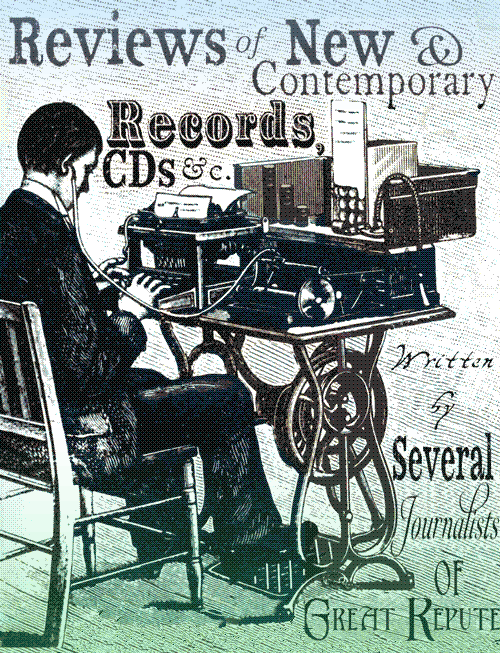 |
|
| =
April 2020 = |
|
|
| |
| Saint Gallus
Convention Tapes |
| Lucifer &
Beyond |
| R.O.T. |
| Lowered |
| Giobia |
| Band for All
Seasons |
| Acid Mothers Temple |
David
Colohan
|
| Cat
Lady |
| Sound
of Yell |
| The
Slowest Lift |
| Myrkur |
| the Prefab
Messiahs |
| Windy and Carl |
| Jeffrey
Andrew |
| Banshee |
| Waterless
Hills |
| Steve Palmer |
| Isolated
Psychedelicists |
| |
| |
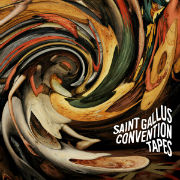 |
SAINT
GALLUS CONVENTION TAPES:
FILES VOLUME 1
(LP
on
Wonderlamp
Records )
If,
like
me, you’ve been delving into the depths of your
record collection of late and unearthing albums
from the last time everything felt really
unsettling what with economic turmoil, people
giving one another malevolent glares and the
Army on the streets (for me it was the early
1970s but obviously you’ll have your own reality
depending on where you live), then you’ll
welcome this rather brilliantly re-imagined
slice of British blues-boom rock melded with
deft touches of stoner psych from Saint Gallus
Convention Tapes. It’s not, granted, a name
which grips one in quite the way names like
Stone's Masonry or the Santa Barbara Machine
Head immediately (as it were) spring to mind,
but the band can’t half play and the production
is just brilliant. Just kick back and enjoy the
band’s extended guitar jam based around Willie
Dixon’s ‘Bring It On Home’ that closes Side 2
and I promise, you won’t regret it.
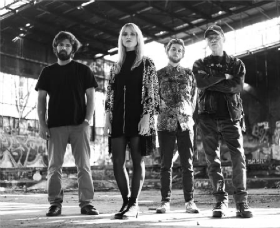 The
band
consists of breathy chanteuse Tonia Goehlich,
who is the Christine Perfect of the band in more
ways than one, who, along with bass player Kevin
Krenczer and drummer Florian Grass, has roots in
the Dortmund stoner-rock and electro scene; and
guitarist Joe Black. Joe Black played guitar and
harmonica in The Hipsters, a garage band based
in and around Oberhausen in the 80s and 90s – I
can remember reviewing singles by them in the
Ptolemaic Terrascope way back. He’s obviously
been practising regularly ever since, and
waiting for the moment when he can let rip on
established blues-rock numbers such as ‘Wang
Dang Doodle’, ‘Smokestack Lightning’ and ‘Done
Somebody Wrong’ all of which are well worth
hearing this tight little band making a fist of.
They also introduce a couple of their own songs
in a similar vein, including the excellent
‘Drought’ – which in turn reminds me of that
summer of 1975 when the standpipes were out and
there was no bread on the shelves. Like I say,
you’ll have your own reality – but do try and
find a place for this, as it’s really rather
good. (Phil McMullen) The
band
consists of breathy chanteuse Tonia Goehlich,
who is the Christine Perfect of the band in more
ways than one, who, along with bass player Kevin
Krenczer and drummer Florian Grass, has roots in
the Dortmund stoner-rock and electro scene; and
guitarist Joe Black. Joe Black played guitar and
harmonica in The Hipsters, a garage band based
in and around Oberhausen in the 80s and 90s – I
can remember reviewing singles by them in the
Ptolemaic Terrascope way back. He’s obviously
been practising regularly ever since, and
waiting for the moment when he can let rip on
established blues-rock numbers such as ‘Wang
Dang Doodle’, ‘Smokestack Lightning’ and ‘Done
Somebody Wrong’ all of which are well worth
hearing this tight little band making a fist of.
They also introduce a couple of their own songs
in a similar vein, including the excellent
‘Drought’ – which in turn reminds me of that
summer of 1975 when the standpipes were out and
there was no bread on the shelves. Like I say,
you’ll have your own reality – but do try and
find a place for this, as it’s really rather
good. (Phil McMullen)
|
| |
|
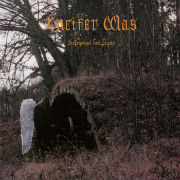 |
LUCIFER
AND BEYOND -
UNDERGROUND AND BEYOND
(LP/DL from https://guerssen.com/)
Based
in
Oslo between 1970-'75, Lucifer Was played plenty
of gigs but never actually got around to
recording anything before they went their
separate ways. That is until 1996 when they
re-united for a gig and enjoyed so much they
decided to record an album of tunes from the
early seventies. Already I can hear alarm bells
ringing in your head as these things often have
a way of sounding self indulgent , over produced
and just plain wrong. This time however it was
inspired as this albums sounds as though it was
recorded and released in 1972 ( or thereabouts)
an album brimming with great riffs, energy,
fabulous playing and a production that is clear
and suitably analogue.
Opening with the scuzzy rock riff of
“Teddy's Sorrow” you are immediately transported
back in time, a heavy seventies vibe cloaking
the track, Reminding me of Leaf Hound or May
Blitz, melodic and rocking at the same time.
This magic continues with both “Scrubby Maid”
and “Song For Rings”, with the latter having
some great flute work, the band have two flute
players making comparisons with Jethro Tull both
lazy and inevitable.
By far the longest song on the album
“The Green Pearl clocks in at only 6:19, making
this a collection of short, concise and focused
tunes, the track kicking into life with the riff
from Hall of the Mountain King (Grieg), a theme
loved by rock groups through the ages, before
the musicians have some fun mixing heavy
passages with lighter pieces creating the most
Prog moment on the album, the ghost of Aqualung
no doubt walking close by.
No doubt the heaviest moment is
“Tarabas” which walks in Sabbath's footprints, a
dark and doomy affair that got me air guitaring
around the room with a big grin on my face.
Elsewhere, “Fandago” has a lazy funky
groove that has a mellower feel, whilst the
final four tunes are all a mix of great riffs ,
fabulous instrumental breaks and fine individual
performances, with “In The Park” being the pick
of the bunch displaying everything that is good
about the band.
Without one duff track within its grooves
this collection is highly recommended for lovers
of that moment when Prog got heavier and Metal
didn't exist yet; practically fucking perfect. (Simon Lewis)
|
| |
|
|
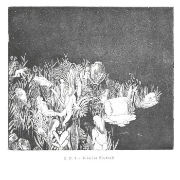
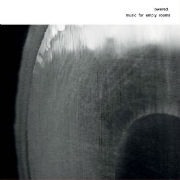
|
R.O.T.
- KLEIN EILAND
LOWERED
-
MUSIC FOR EMPTY ROOMS
(CDs from http://www.morctapes.com/)
Featuring
core
members Laurent Cartuyvels, Bram Borloo and
Christophe Piette R.O.T are a free flowing
collective that specialise in improvised music
and shy away from any trappings associated with
a traditional rock band.
Recorded in an abandoned, now
demolished, building, “Klein Eiland” features 10
untitled tracks ranging in length from 2-12
minutes, each track obviously part of one
performance as they contain very similar sounds
and textures. Never particularly harsh the
atmosphere created is otherwordly and surreal,
the music of dreams, percussion and electronic
treatments creating waves of sound that wash
over you then recede into distant memory.
As if to break the performance in half,
“Track 6” begins with a volley of percussion
that wakes you from your dreaming, reminding me
of a Buddhist ceremony, scattering Demons and
filling the room with energy, a cleansing that
paths the way for the next piece, 12 minutes of
high end drone, the sounds making my cats
slightly tense as they try to sleep next to me.
To end, track 10 is a cavernous slice of
sounds, a slow motion avalanche that rumbles
through your brain beautifully, I imagine it
sounded amazing at high volume.
If I had one complaint it is the gaps
between the tracks break the spell, it would
have been nice to hear them mixed together
somehow to allow the music to flow between them,
a small point that should not detract from what
is a fine
album. If you have never dipped your toe into
improvised, free music this would be a great
place to start.
Utilising
just Piano, Cello, Singing Bowls, Tam Tam and
Room Tone, Chris Gowers creates beautiful and
meditative drones under the name Lowered,
the music drifting and slightly melancholy,
stretching time and re-creating the space around
you.
Featuring just three tracks, opener
“Sound in this Room” is a 116 minute devotion
the different tones of the instrument working
together to create some amazing sounds that
become even more unbelievable when you realise
that it is all acoustic with no electronic
treatments at all, something that is hard to
fathom on first hearing. Halfway through the
track, the sounds have dissolved into a soft
white noise and rumble that is very soothing,
the music almost invisible to the ears, the
track slowly coming back into focus as the Cello
adds some deep drones over which the Piano
slowly marches to the inevitable conclusion, the
white noise shrouding them both as it fades
away.
Calling a track “Emptiness” gives the
listener a good idea of the atmosphere of the
piece, especially if you have just heard track
one but it does not prepare you for the stark
beauty to be found as the drone rises up your
spine, Singing Bowls and the Tam Tam levitating
together over eight glorious minutes that are
over far too soon, the nuances of the sounds
creating something very special.
Beginning with a slow Piano that chimes
and calls, “Distance Flooded In” is another
beautiful piece that works best if you lie on the
floor and let it just wash over you, ending an
astonishing album that will become an old friend,
the music timeless and engaging, something to be
treasured in these uncertain times. (Simon
Lewis)
|
| |
|
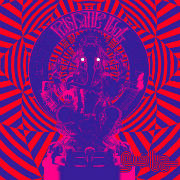 |
GIOBIA
–
PLASMATIC IDOL
(LP/CD/Cassette/Digital
on Heavy
Psych Sounds Records)
Milan,
Italy based Giobia bring us their fourth LP of
acid-drenched psychedelia Plasmatic Idol.
First off, we hope and pray for the
band’s well-being in light of how the
Coronavirus has wracked Italy.
Giobia is on the medium level of Italian
label Heavy Psych Sounds’ releases that
frequently trod deep into the red on the decibel
meter (they ain’t Heavy Psych Sounds for
nothin’).
I
love bands and albums that create a whole
enclosed sonic world unto themselves, and Giobia
does just that.
Once you set foot in Plasmatic Idol, it’s
as if a door (of perception - sorry, not sorry,
couldn’t resist) closes behind you and you’ve
entered another dimension.
Theirs is a sound heavily layered with
organ/synth, guitar, and gallons and gallons of
oozing reverb. It’s
no accident they’re frequently compared to
Hawkwind or Pink Floyd.
Plasmatic
Idol is also the rare album which seems to
improve with every track.
By mid-Side One, you’re cruising, and the
songs just keep getting better.
The short instrumental title track
reminded me of ‘70s and ‘80s Japanese electronic
ambient artist Kitaro, with its swooping
synthesizer leads.
Next track “Haridwar” actually takes a
historically over-used guitar chord progression
and at least dresses it up with all sorts of
guitar and keyboard goodies, before departing
for instrumental parts unknown.
One
of Plasmatic Idol’s hallmarks is vocals
throughout so laden with reverb and swirling
effects you won’t make out a word of what
they’re saying and I.
Just. Love.
It. Giobia
also gets it just right in the album’s balance
of instrumental and vocal songs and passages.
And it’s not purely psych – Giobia adds prog
and classic rock genres as well; the album’s
lengthy centerpiece “Far Behind” is a journey
that touches ‘em all.
The album’s also not stuck in any one
timeframe; you can hear references from the
‘60s, ’70s, ‘80s, all the way up to neo-psych.
My
favorite track is “Heart of Stone,” a gauzy,
woozy psychedelic waltz, built from layer upon
layer of sound, including violin, organ, guitar,
and about a million synthesizers.
The ghostly, echoing vocals bounce around
the walls of your mind, where ironically, about
the only line you can make out is “no one can
hear my words.”
Closer “The Mirrors House” starts with
creepy dialogue that sounds like it could’ve
come from a Hammer horror film.
The song continues the nightmare theme,
with those unintelligible lyrics again, but the
music is unmistakably a horror soundtrack,
forceful, unrepentant and potent.
The
album’s artwork by Metastazis is fabulous, and
the LP is available in a variety of badass
splatter and colored vinyl options, so scoop ‘em
up while you can (though the band has apologized
for understandable shipping delays due to the
recent unpleasantness).
Score yourself a copy.
(Mark
Feingold)
|
| |
|
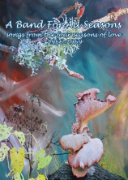
Home |
VARIOUS
ARTISTS - A BAND FOR
ALL SEASONS: SONGS FROM THE FOUR SEASON OF
LOVE 1966-1969
(4CD on Fruits
De Mer)
The fine folks at Fruits De Mer (take a
bow Keith Jones) have expanded their earlier 3LP
set, The
Three Seasons to produce this 4CD version,
which more than doubles the number of tracks to
61. Since our very own Andrew Young thoroughly
reviewed the original here,
we’ll focus on the additional tracks which make
this an essential purchase for those who missed
the sold-out-on release LP set (and a welcome
addition to the record collections of the lucky
few who scored first time round). One-man band
and fellow music journalist Andy Morton (aka Campbell
Stokes
Sunshine Recorder) delivers a spot-on
‘Amelia Jane’, a slice sunshine pop from 1967
courtesy Made In Sheffield, while Azalia Snail
and Dan West (aka LoveyDove)
hit ephemeral heights of frilly fantasy with
Drimble Wedge and The Vegetations’ (readers of
the Terrascope will now who’s hiding behind this
pseudonym) ‘Bedazzled’, which frankly sounds
like it was listed straight off the Barbarella soundtrack!
The
Zodiac: Cosmic Sounds released a wonderful
cash-in album in 1967 featuring electronic
ruminations on the signs of the Zodiac. Jack
Ellister has selected ‘Aquarius’ for an
updated 21st century take on ‘60s space music
(literally!), but the set’s most unusual
re-imagining must be Rob
Gould’s nine-minute electronic – think
Pink Floyd-meets-Vangelis-meets-Tonto’s
Expanding Headband! – rewrite of The Purple
Gang’s ‘Granny Takes A Trip’ that’s about three
times as long as the original and five times
trippier! [We’ll hear from The Purple Gang later
on Disk 3 with their unreleased version of Syd
Barrett’s ‘Boon Toon’ that was slated to succeed
‘Granny…’.] The Small Faces are not especially
known as a psychedelic band, but Mark
McDowell succeeds in wringing out the
cobwebs and red eyes from Ronnie Lane’s ‘Up The
Wooden Hills To Bedfordshire’ and it’s 1966 all
over again! We’ll hear more from the Small Faces
on Disc 3.
Nick
Drake has become a sort of go-to candidate for
cover versions as of late, and Jay
Tausig adds a sleepy orchestrated ‘Time
Has Told Me’ to the canon, with a nice twangy
edge reminiscent of Neil Young’s
country-inflected solo material. Very nice
indeed. While Starlings
Planet’s update of Please’s ‘The Story’
rings of too much of a Claypool Lennon Delirium
influence for my taste, Bhopal’s
Flowers’ sitar-drenched revisit to Cream’s
‘I Feel Free’ is a surprisingly effective
Eastern-flavoured rendition that breathes new
life into the old chestnut. Francis Rossi’s
indelible guitar riff in ‘Pictures Of Matchstick
Men’ is one of the iconic blasts from the
psychedelic era, so wisely The Jeremy Morris’ Band
leave it virtually untouched and concentrates on
some seriously searing stringbending with a
tremendous coda solo. Six strings are also set
ablaze by Mark Forster’s Cat Frequency for an intensely vibrattoed fuzz ‘Flameout’ that the
101 Strings couldn’t even begin to imagine back
in 1968.
Italian
proggers
London
Underground wrap Cannonball Adderley’s
‘Mercy, Mercy, Mercy’ in a sweet swirling
Hammond overcoat, while the Mysterious
Clouds featuring Your Friend turn H.P.
Lovecraft’s ‘Mobius Trip’ into an hallucinogenic
dream, although it feels like someone pulled the
plug before they finished. Too bad. Van Der
Graaf Generator’s ‘Refugees’ is one of my
favourite tracks on the eponymous Charisma label
sampler, so my preconceived prejudice may
unfairly dock a few points off Finnish
prog/psych outfit Permanent
Clear Light’s credible update, but Echo
Train (Greek, judging by their surnames)
ratchet up the blood pressure with Ren’s
incantatory spoken words conjuring forth a
soaring, synth-drenched progtastic ‘Portland
‘69’, quite different from Hunger’s garage psych
original. Disc 2 ends with July
stalwart Tom Newman leading some “friends”
through a 21st century swathe of
swirly noise that breathes new life into the old
dusty chestnut ‘My Clown’ during a live 2016
performance.
Half
the tracks on Disc 3 are new to the set,
highlighted by I Am Voyager 1’s floating Floydian instrumental rendition of Tim
Buckley’s ‘I Never Asked To Be Your Mountain’, Elfin Bow & Gary Lloyd’s tender and intimate revisit to the
Small Faces’ ‘Autumn Stone’, The
Telephones’ kinder, gentler ‘I Can Hear
The Grass Grow’ (Move), the Electric Crayon
Set’s Timo Pääkko’s new project Mr.
Armageddon and the Suicide Society
shredding the Bonzos’ ‘We Are Normal’ in full-on
punky sonic attack a la the Deviants’
self-destructive mayhem, and The
Purple Gang finally recording Syd
Barrett’s ‘Boon Tune’, their slated follow-up to
their tripping Granny in their inimitable
vaudevillian style updated with a hazy, dreamy
electronic coda.
Excepting
the
Pretty
Things ‘Loneliest Person’ track from their
2010 Half Moon gig, Disc 4 consists of
previously unreleased tracks. Things are off to
an encouraging start with Chad & Jeremy’s
unplugged revisit to ‘Rest In Peace’ off their
brilliant 1967 concept album Of
Cabbages And Kings. After 50+ years, their
intricate harmonies are just as glisteningly
heartwarming and the baroque acoustic
arrangement ranks with their finest efforts. Schizo Fun Addict will make you forget all about the Mamas &
Papas’ rendition of ‘Dedicated To The One I
Love’ as it successfully recreates a 60’s
sunshine pop afterglow, and Hanford
Flyover bathe Neon Pearl’s ‘Just Another
Day’ in a dreamy golden synth shower of sounds
that will have you giving the original a fresh
listen. Swedish duo Us
and Them breathe new life into the obscure Neil Young ballad ‘What
Did You Do To My Life’ with their gentle
folk/prog hybrid and Nathan
Hall shows us just how wonderful the early
Bee Gees’ catalogue is with a faithful
recreation of the acoustic pop ditty ‘Please
Read Me’ from their essential debut.
Cranium
Pie give us a lot to consider with their
phased-to-the-max, underwater-gargled
‘Baby You’re A Rich Man’, the Crystal
Jacqueline Acoustic Band add just the
right feathered touch to Roger Waters’ classic
navel gazer ‘Grantchester Meadows’, and Andy
Morton (who we enjoyed in his Campbell
Stokes Sunshine Recorder guise back on
Disk 1 is even better in the company of his Back Street Carnival with their “pretty” sunshine pop psych version
of Strawberry Alarm Clock’s ‘Pretty Song from
“Psych-Out”’. I don’t need to remind readers why
they’re the perfect band to cover this gem! But
I must confess that nothing will prepare you for
the astonishing side-long (that’s 17½ minutes!)
jam fest of psychedelic headfucking that the
prolific international (US/Sweden/Spain)
psychedelic brain circuit rewirers the Lemon Clocks deliver in their mind-melting, numbness-inducing,
cotton-mouthed spectacular, ‘Crimson and
Clover’.
But
wait…there’s
more… Like Mark
Brierley’s 50th anniversary
revisit to his ‘Welcome To The Citadel’, still
as poignant and heartwrenching as the day we
enjoyed it 50 years ago sat crosslegged on the
floor with our heads in the clouds and our
hearts in our throats.
A
Band For All Seasons is an historical and
instructive overview of the psychedelic ‘60s
heyday some 50 years removed, featuring 21st
century approaches to an excellent and eclectic
mix of the usual suspects (Cream, Stones,
Donovan, Small Faces, Traffic, Yardbirds,
et.al.) and beloved underground unknowns (H.P.
Lovecraft, July, Simon Dupree, Marc Brierley,
Neon Pearl, Kaleidoscope and many others). In
fact, a companion 4xCD set of the originals
would rival or surpass any Rubbles, Nuggets, Perfumed
Garden, or Chocolate Soup For Diabetics box as a definitive overview of what
the UK/US psychedelic, acid folk, progressive,
garage ‘60s music scene was all about.
(Jeff Penczak)
|
| |
|
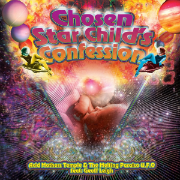
Home |
ACID
MOTHERS TEMPLE – CHOSEN STAR
CHILD’S CONFESSION
(LP/CD from www.riotseason.com)
The gazillionth album release from the enduring Japanese titans who, in
acronym form, should never be confused with a
cash machine is their second since rekindling
their on-off association with Andy Smith’s Riot
Season and with their latest line-up, still
coalesced around Grand Master Templars Hiroshi
Higashi and Makoto Kawabata.
Chosen
Star also continues the rich legacy of eye
catching album and song titles, some of which
have been known to be excruciatingly punning
even by your scribe’s lamentable standards but
which, together with the never understated cover
art is always guaranteed to get them noticed. As
if they need props when the sublimity of so much
of the rich and yes, varied, catalogue bears
testament to the lasting and thoroughly deserved
appeal of this most aurally stimulating of
galactically inclined ensembles.
Chosen
Star…is
in fact the first album of new material
featuring the current line up and it hardly
disappoints. ‘Nightmarish Heavenly Labyrinth’
sounds like it ought to be all phasers, flangers
and everything else set to stun yet for the most
part is anything but the terrifying entity
suggestive of the title. It is in fact rather
enchanting with skipping, jazz-like drum
caresses and nifty, nimble bass runs, over which
guest Templar Geoff Leigh’s flute mellifluously
pipes and trills while Hiroshi keeps lobbing
space drips into mid-space. It’s only in the
final stanzas that Makoto unleashes coruscating
squalls from his guitar and the band kicks into
a brisk canter while still anchoring the sound
in something which might be considered melodic
structure. From acoustic beginning and thanks in
no small part to Jyonson’ Tsu’s vocal, ‘Diamond
Eyes Are Hurt’ has a strangely Gallic appeal not
dissimilar to a jazz lounge Stereolab. Leigh’s
saxophone this time gleefully spray paints a
vast cosmic canvas and Wolf’s bass again burrows
this way and that. What is noticeable here, too,
are the dub as well as jazz and space rock
influences, as if Lee ‘Scratch’ Perry had got
his mitts on AMT’s old mates Gong and used them
as Black Ark lab rats.
A repeat guitar motif and circular sung patterns renders ‘Cometary
Orbital Drive’, a close cousin to ‘Pink Lady
Lemonade’, Satoshima Nani urging it into a fast
clip at the mid-point before the hitherto
reticent Makoto fires off a lyrical guitar solo
which succeeds in pulling it back from a
precarious precipice over which it was in danger
of falling (although by now Leigh appears to
have all but disappeared into the chasm, more
the pity). By
contrast the shortest cut (at 6 minutes)
‘Infected J also Live Beast Catastrophe’ is a
feverish collage of sound. Here is AMT at their
most experimental, the noise of a souk or
middle-eastern bazaar clatters and jostles until
a jolting change of pace and tone as the whole
basket of snakes is kicked over creating a
hellish outpouring of combustion. This just
leaves ‘Santa Maria Enfance’, the CD only extra
track (minus Leigh), which finds raga drone
interludes taxiing to and from what the Temple
do best - brakes off, everything plus the
kitchen sink scorched psych overdrive (have that
one on us for the next album title). It’s
strangely folk-rock- like in a way that if you
combined Gaudette, Fairport’s jigs and reels and
Hawkwind circa In Search Of Space and yes, I may
be suffering just a little from early onset
cabin fever just two weeks into lockdown.
Suffice to say it pretty much disappears off the
scale by the end of the allotted time at which
point it subsides back to the drone.
It’s hard for me to assess how this release and indeed this line-up ranks
in terms of the band’s vast discography and
byzantine family privet. Whichever shape and
form it takes and whoever is on board the craft
AMT is a band of brothers and sisters, a
testimony to the sum of the parts. What is just
a little bit special about this is that the
guesting Geoff Leigh provides not just the
fondant icing but a delicious depth of flavour,
particularly on those first two tracks on which
his flute and sax step respectively to the fore.
I’m betting it’s those cuts rather than the more
obviously incendiary ones that I’ll keep coming
back to. There again you pay you money and you
take…
(Ian
Fraser
)
|
| |
|
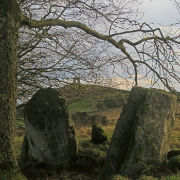
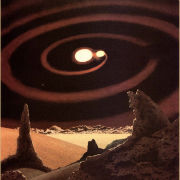
Home
|
DAVID
COLOHAN
- WALKING GHOST PHASE
(https://davidcolohan.bandcamp.com/)
CAT
LADY - SING THE
REVERBERATE HILLS
(https://iamplinth.bandcamp.com/)
If
there
is a light to be found in isolation it is the
chance to listen to music that may well have
passed you by in busier times and here are two
electronic inspired albums that I may well have
missed without the lockdown.
First up “Walking Ghost Phase” is
dedicated to Walter Wegmuller (Tarot) and
contains four tracks, entitled I,II,III and IV,
each lasting exactly twelve minutes. Opening
with “I”, the music is a soft electronic breeze,
a gently rolling drone that floats lightly as if
blown from a far off land. As the piece
progresses twinkling sequences dance above the
breeze beautifully, the music soothing and
contemplative.
Adding more textures, “II” opens with
drifting chords from a Mellotron (possibly) and
some sweet guitar lines that sing like a siren
calling you home, the piece taking you on a
dream like journey as it slowly drifts forward
building in intensity as it does so becoming a
rich sea of sounds that ebb and flow
wonderfully.
Moving on ,”III” is a rich drone that
levitates and relaxes, hints of Rhythm adding
warmth before
“IV” begins with a lonesome, sombre melody line
that is aching and beautiful, the whole piece
wrapped in autumnal melancholy that is majestic
yet lonely you only have to close your eyes to
be transported to a mountain top or empty ,
rocky beach your imagination adding bird sounds,
waves or the wind through the trees. Having just
reviewed this as I heard it for the first time I
suspect that there is a lot more to be
discovered every time I listen, something
am eager to explore as should you be.
Influenced by early synths, Vangelis
and the art of Chesley Bonnestell, Cat Lady
was a collaboration between Michael Tanner and
Matthew Shaw, that managed only two recording
sessions and one gig, bit of a shame as the
album is a wonderful mix of electronic textures
and sounds.
Opening with “Cephee”, which features a
guest appearance from David Colohan, you are
drawn in by the other-wordly charm and
atmosphere, the track a slow release launch pad
into a different universe. Revealing the
Vangelis influence, “Persee” contains rippling
piano that is very reminiscent of Mr Vangelis,
in a good way, leading us nicely into the short
drone of “Cygne” a track that fades before it
really begins, leading into “Andromede” a
delicate, shimmering drone that settles lightly
in the room like a butterfly on a summer's rose,
the music calming and timeless.
After the one minute sound mirage of
“Cassiopee” we reach the final, and
longest, track on the album as “Le Dragon”
settles in for eleven minutes of
loveliness, another sweetly floating drone with
flecks of piano adding texture and light, all
you have to do is breath and let it all wash
over you.
With
many a thread to bind them, these two albums work
beautifully as a pair soothing and caressing your
ears, just delightful. (Simon Lewis)
|
|
|

Home
|
SOUND
OF
YELL – LEAPLING
(LP/DL
from
https://chemikal.co.uk)
It’s hard, I know, to draw too much comfort from the current pan-global
pestilence except that on a personal note both
your Esteemed Editor and Yours Truly are most
likely relieved that it was last year and not
this that we decided to stage Woolf Music.
Indeed among those events cancelled as a result
of the most virulent of uber-lurgies was to be a
tour by Stevie Jones’ shapeshifting curiosity
Sound Of Yell (performances range from solo to
full eight piece ensembles) to promote this
their long gestating follow up to 2014’s Brocken
Spectre.
Stevie played Woolf, eschewing the usual variables of human accompaniment
in favour of just guitars, percussion and a car
boot load of effects and that it should have
been impossible for anyone with just twenty
digits to master. One of two dozen or so
highlights, then. Here the players return, with
Jones aided and abetted by a supporting cast
which includes among others Alex Neilson
(Trembling Bells and Alex Rex) and Alasdair
Roberts, themselves Woolf alumni and who also
appeared together under the metaphorical
Terrascope banner at Café Oto a few years back.
Thanks to Jones’ background and collaborative resume, Leapling
is bound to be labelled as “folk” which I
suppose it is, in much the same way as Massive
Attack is implausibly lumped in with “dance”
music. An acoustic smorgasbord of fingerstyle
guitar, singular strings and eccentric-sounding
woodwind and all-over-the-kit percussion where
bucolic drones mingle with pastoral chamber
arrangements this takes it cues from all manner
of esoteric styles including some that have yet
to be identified. Ponder the fade in at the end
of Strawberry Fields and now imagine that
stretched to an album’s worth of illogical
conclusion while stuffed to bursting point on
instinctive and skewed inventiveness. It’s busy,
very busy. Friends, or anyone for that matter,
lend me an extra pair of ears.
While at times suggestive of a more genteel Richard Dawson the
neo-classical influences resonate much like
you’d expect from a western sounding Third Ear
Band (that’s them, camped out in a field
someplace far off to your left). The initial
‘Another Green World’ stylings of ‘Boneless’
evolve into a jauntiness underpinned by some
spectral scraping and cattle-prodded by
Neilson’s restrained yet still free form
drumming. The title track’s eerie drone and
sparse vocal is given a semblance of bodily form
by an elfin ensemble whereas the more upbeat
‘Hello Ramp’ does indeed ramp things up a notch
with its warped woodwind and meatier percussive
propulsion. By the time we encounter the
spectral whine of Theremin on ‘Flame Soaked
Seer’ (oddly reminiscent in places of
‘Mysteries’ by Beth Gibbons/Rustin’ Man from
their Out Of Season album some years back now)
and move onto ‘Slice The Spray’ I swear I can
hear the Swingle Singers and glimpse the ghostly
outline a bloke in a tatty coat standing on one
leg and puffing into a flute. This truly is a
befuddling Aladdin’s cave or should that be
Steptoe’s yard of noise and texture, at once
melodic and bizarrely discordant.
The beauty of ‘Winged Cadence’ and the plunking, dreamlike ‘Halo Jones’
are but fleeting staging posts before album
closer ‘Angel Lights’ with its breathy woodwind,
percussive guitar and a barely perceptible vocal
all shot through with that marble effect of
scratchy violin provides the bittersweet finale
that manages to both soothe and stimulate. A few
more listens will confirm whether or not Leapling
is destined to have the same enduring appeal as
Brocken
Spectre. A betting man might just give
you even odds.
(Ian
Fraser)
|
|
|
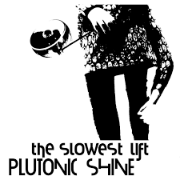
Home
|
THE
SLOWEST LIFT – PLUTONIC
SHINE
(LP
on Feeding
Tube Records)
The
Slowest Lift are now three releases old with
this new vinyl release on Feeding Tube that
follows an originally self- released version
last year on limited edition cassette and
download (cassettes still just about available
at the time of writing for those who like such
old school technology). It’s a collaboration
between Sophie Cooper, a composer and multi
instrumentalist at the heart of the vibrant and
innovative Todmorden and West Yorkshire folk,
psychedelia and experimental music scene
including co-curating the excellent ‘Tor Fest’
and Julian Bradley of long standing psychedelic
drone voyagers, Vibracathedral Orchestra and as
with all successful collaborations there’s a lot
of musical sparks flying and interesting ideas
explored.
Opening
track ‘My Body Forms a Path’ takes a hazy,
pulsing, almost stately drone and wraps it
around a Nico-esque dirge before exploding into
relentless waves of noise under which the vocal
and a repeating melody just about holds its
ground before fading to its conclusion. ‘Unloop
My Heart’ takes a distorted noise infused melody
with a distant vocal into the realms of
experimental psychedelic pop. It is harsh but
delicate, spacey and yet claustrophobic and it
fizzes with crackles of noise as though it might
collapse into itself any minute. ‘The Birds
Float the Slowest’ starts slowly but soon is
chaotic in all the best ways throwing hazy
vocals into a noisy stew with off kilter
twanging guitars and a whole lot of distortion.
‘Take Off Your Badge’ uses multi tracked vocals
and a distorted wave of slowly evolving melody
to highlight the sonic beauty that can come from
well- judged use of noise and distortion. In a
way I pick up the same melodic and ambient
sensibility that I get from bands like Bardo
Pond who understand how to maintain melody
within often noisy and experimental psychedelic
forays and that’s a good thing. ‘Sage Reach’
positively broods in the dark opening drone
space it creates where Kosmische and an almost
medieval feel with perhaps shades of Pelt come
together in a relatively short but evocative
soundscape. ‘Brother’ is more of an experimental
vocal led track where the music has a more
manipulated and choppy ‘avant pop’ feel and
takes the record briefly in a different
direction but not so much as to ruin the overall
flow. ‘I’m Born’ is the first track to employ a
specific rhythm albeit a subtle almost
ritualistic touch in the background and it’s got
a fine folk informed structure where incantatory
vocals and traditional melodies are energised
and elevated by vocal and sound treatments that
are both spooky and mysterious. ‘Guided By
Photographs’ is gorgeous, toning down the noise
and distortion to let a lovely almost hymnal
vocal melody speak for itself with more subtle
textural sounds creating a beautiful and serene,
almost blissful setting which has faint melodic
and vocal echoes of Sigur Ros. The closing track
is the title track and it is also the longest
track. A swirling cloud of vocals and noise
imbued electronic and treated instrumental
textures slowly unfolds throughout its seven
minutes with touches of church like elegance,
experimental freeform noise and spacey
atmospheres ebbing and flowing and blending
wonderfully to create a mysterious, at times
disturbing but often beautiful sound.
This
is a record full of invention, atmosphere and
texture where amongst other things, sometimes
harsh yet often strangely elegant noise, free
folk beauty, avant pop sensibility and
interesting songwriting ideas combine to create
a compelling, curious and very satisfying
listening experience. An
excellent collaboration and one you should
investigate.
(Francis Comyn)
|
|
|
|
|
|
|
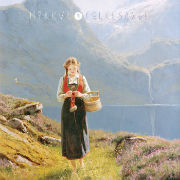
Home |
MYRKUR
– FOLKESANGE
(LP/CD/Digital
on Relapse
Records)
Myrkur,
the project of Danish artist and
multi-instrumentalist Amalie Bruun, brings us
her third full-length LP.
The album’s title translates to – oh,
never mind. The
LP, made up entirely of folk music in the Nordic
tradition, is a stunning turn for Bruun, who
made her reputation in the dark world of Black
Metal. But
truthfully, however, her previous works
contained at least some tracks in this folk
style; only on Folkesange does Bruun go all the
way.
Myrkur
has a beautiful voice, which she often layers in
multiple harmony overdubs, bathed in
cathedral-style echo.
The songs on the album are sung in
Danish, with the exception on two English
language tracks.
She plays every instrument, but as for a
folk record you’ll find nary a guitar; she plays
traditional instruments such as lyre, mandola,
nyckelharpa and tagelharpa.
The songs are a combination of
traditional Scandinavian folk works or originals
by Myrkur written in that style, seamlessly
interwoven.
Myrkur’s
blended harmony sound recalls Enya and Clannad,
though she wisely picks and chooses her spots to
use it. And
if you’re wondering, Danish folk song isn’t a
million miles from Celtic.
The production, by Christopher Juul, is
very slick. Indeed,
the album’s overall sound comes perilously close
at times to pleasant coffee shop soundtrack
music, but it doesn’t cross that line.
Myrkur’s the real deal.
Full
of lovely, melancholic melodies and
arrangements, Folkesange is a soothing balm for
our troubled times.
The deeper and further you get into it,
the more Myrkur envelops you in comfort.
On some of the tracks, Bruun uses the
vocal technique known as kulning, a startling
call used for both herding and scaring off
predators. The
song “Tor i Helheim” starts with Bruun doing a
Capella kulning, and I recommend you secure your
dogs before it starts.
But ironically, the rest of the track,
taken from the myth of the goddess Hel, is quite
sublime.
Both
of the English language songs are delightful.
The first, “Leaves of Yggdrasil,” is a
beautiful Myrkur original about “the fairest
maiden of the kingdom” with “hair of silver,
snow and ice” who loses the love of her life “in
the land of a thousand forests.”
The second is the traditional English
ballad “House Carpenter” about a woman who
forsakes her husband (the house carpenter) and
child for a former lover who lures her on a ship
destined, it turns out, for hell.
The lively arrangements of both songs
canter along perfectly, and Bruun sings in
English as if she does it all the time.
The selfish English speaker in me says
“more English songs Amalie, pretty please?”
Closer
“Vinter” (Winter) is perhaps a lullaby for
Bruun’s new child.
Using a wordless choir and piano, she
conjures up images of a Christmas carol amid
snow-covered hills and trees.
It’s astonishing how much you can say
with the word “aah.”
The piano outro will utterly take your
breath away, as gorgeous and impressionistic as
anything by Debussy or Ravel.
Myrkur
has given us a much-needed gift of ethereal
Nordic folk songs to help with these troubled
times. Folkesange
grows dearer as it goes along – indeed the
second side is perfect – and then continues to
grow with each listening.
(Mark
Feingold)
|
|
|
|
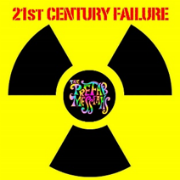
Home
|
THE
PREFAB MESSIAHS – ‘21ST
CENTURY FAILURE’
(Available
on Bandcamp)
Boston’s
self-proclaimed
“micro legendary garage pop pych band” offer a
timely little ditty for all you stay-at-home
folks honouring safe distancing and
self-isolation techniques as we wait out these
dangerous times. Featuring Kris Thompson from
our Terrastock friends Abunai! and Lothars, this
tongue-in-cheekily cheeky chuckle is an
irreverent “gotta laugh to keep from crying”
salvo aimed straight at the funny bone. From its
Sex Pistols-styled opening guitar riff (cf.,
‘Pretty Vacant’) to its catchy ‘60s keyboard
fills and irreverent chorus (Devo-meets-Tubes
with a healthy dose of kitschy Rezillos and
B-52’s bop), it’s a pop pogostick that you can
dance to in the comfort and safety of your own
home.
(Jeff Penczak)
|
|
|
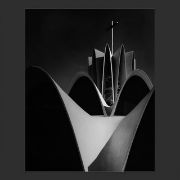
Home |
WINDY & CARL –
ALLEGIANCE AND CONVICTION
(Kranky)
Few
things are as calming as the rhythmic clank of a
platen press or as comforting as the homely
whistle of a kettle, but Windy and Carl’s music
comes bloody close. The duo are of course old
friends of ours and still after all this time
the sheer mastery of their craft and the
expressiveness of their music sounds completely
effortless, although as with all these things
what appears to be simple and uncomplicated is
invariably anything but. What’s perhaps unusual
about this record amongst the W&C canon is
that the nine-minute ‘Moth to Flame,’ which
flickers atmospherically like the echolocation
clicks of fluttering bats, is the exception
rather than the rule; the other songs are almost
half that length, although ‘Alone’ comes close
and varies the timbre as a hint of desperation
creeps into Windy Weber’s voice like the cries
of a lost soul at sea amidst the wails of lonely
fog horns. (Phil)
|
|
|

Home |
JEFFREY
ANDREW – MELODIC ABYSS
(Digital,
Self-Released)
There’s
just something about a jazz piano trio.
Piano, bass and drums playing upbeat
tunes or ‘round midnight smoky noir sounds to
brushed drums – it just oozes cool.
New artist, pianist Jeffrey Andrew adds
his name to a long heritage of keyboard
excellence. Whether
your taste is Bill Evans, Nat King Cole, McCoy
Tyner, Dave Brubeck, Oscar Peterson or Vince
Guaraldi, the simple piano jazz combo puts you
in the right mood to suit your fancy.
Jeffrey
Andrew is from Indianapolis, Indiana and
attended Indiana University’s Jacobs School of
Music, but he makes Brooklyn his base now.
He’s produced music for advertising, and
played keyboards in many live venues such as the
Apollo Theater and the Blue Note. He
self-released this five song EP, and about the
only way I reckon you can hear it is through the
major streaming services, where it sits waiting
patiently for you.
He appears to have one previous (even
shorter) EP, of Christmas music.
Andrew
has a great reverence for melody.
The EP’s title refers not to an abyss to
where the melodies escaped.
His compositions are tuneful, his piano
technique studied but not flashy.
The tracks are upbeat, with occasional
tempo variations to keep you on your toes.
This is music to feel good by.
The uncredited drummer provides the
perfect, lively accompaniment to Jeffrey
Andrew’s rhythms (one of the few websites about
the album says Andrew plays all the instruments,
but I don’t have any confirmation of that).
My
only complaint is it all goes by too quickly.
At 17 minutes, the EP flies by, leaving
the listener grasping for more, always a good
sign. Whether
you’re listening intently – which it deserves –
or have it in the background for working from
home in these crazy times, or exercising,
Melodic Abyss is right for it.
I look forward to a label discovering
Jeffrey Andrew and getting a Long Player.
(Mark
Feingold)
|
|
|
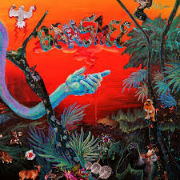
Home
|
BANSHEE
- LIVIN’ IN THE JUNGLE
(LP/CD
on Cardinal
Fuzz Records)
Banshee
hail from Boston, Massachusetts and as their
name would suggest we are not about to talk
about quiet and subtle minimalism. As I write
this review in the garden I can hear the sound
of my neighbour’s ever so slightly annoying DIY
and its associated bish, bash, bosh and
therefore in the spirit of neighbourliness I
shall crank up the volume to noise cancelling
levels. Under any circumstances I suggest you do
the same with this fine record.
The
opening short collage of sounds that is
‘Genesis’ evokes no comparisons with the band of
that name you may or may not be pleased to hear.
It has a primal, ominous and perhaps
unsurprisingly jungle feel as a prelude to
exploding into ‘The Law’ which has a trashy,
snotty metallic punk feel but with touches of
The Stooges and MC5 that comes through in the
guitar solos along with a touch of Thin Lizzy
and Kiss at times. It’s a real head nodding
treat followed by ‘Dawn of Man’ and its opening
flurry of electronics before the influence of
Alice Cooper is writ large for all to hear and
enjoy in a la-la-la-along belter with a touch of
raga like melody that surely will be an epic
piece of live action. Guitars and what sounds
like a violin take soaring solo spots and a
Stones-ey like conclusion bring the track to a
thrilling and slightly chaotic end. ‘Livin’ in
the Jungle’ as might be imagined starts with a
touch of jungle noise before another solid and
driving riff takes over but again with touches
of often dramatic instrumental colour managing
to work their way through the metallic heft of
the Stooge-y Stones mayhem. Another ambient
interlude with guitar takes us to ‘Savage Man’
which has a crunching riff and another
Alice-like vocal and hearty chorus.
‘Credo’
is another short interlude which uses eerie
clock- like chiming percussion and a more than
slightly unhinged vocal to create a sinister
folk melody that leads into ‘Snake Charmer’, a
high octane psychedelic rock blast that melds
60’s garage punk with perhaps a little touch of
the psychedelic rock that found its feet in the
90’s such as via the good offices of
Spiritualized. ‘The
Inner Circle’ takes a more acoustic rocking
stance with an eastern vibe flowing through the
piece and some wonderfully dramatic guitar
soloing dancing in the background as it slowly
picks up a more frantic pace and power to its
fade. ‘Summoning’ is another short and spooky
interlude with faint ghostly jazzy touches
before ‘The Atomic Flu’ takes us into a more
full on and pretty dramatic psychedelic rock
mode with a strong eastern influence and another
big guitar showcase all topped off with a
growling Cooper-esque vocal. The finale is
‘Caged Birds’ and at seven and a half minutes
the longest track on this record. It starts as a
steady psych rocker with an almost laid back
groove and little flurries of guitar taking
occasional detours into spacier places. The
second part of the track raises the temperature
and showcases some fine wailing guitar work that
slowly gets out of control until it fades into
the jungle once more.
Banshee
know how to build up momentum and singalong
catchiness through a good solid riff, rhythm and
chorus in the classic style of 60’s garage punk
and the metal bands that clearly influence them.
At the same time they understand atmosphere and
unleash some pretty wonderful guitar excursions
into wilder places and add some sound textures
and melodic touches that separate them out from
the pack. There are a lot of influences at play
and they use them well and any vocal that
reminds me of the best bits of Alice Cooper is a
tick in this writer’s box. Well worth your
attention and a record that is good for your
ears, voice and feet can’t be bad – I even think
my neighbour stopped banging things to listen.
(Francis Comyn)
|
|
|
|
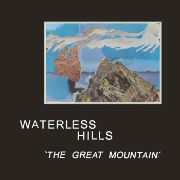
Home
|
WATERLESS
HILLS – THE GREAT MOUNTAIN
(LP
on Cardinal
Fuzz Records and Feeding
Tube Records)
Waterless
Hills brings together a quartet of musicians
from overlapping musical circles that straddle
folk, left field rock and improvisation. Dan
Bridgwood-Hill aka dbh is a composer and
multi-instrumentalist (here playing violin) who
writes and performs solo and in various group
settings across the Manchester and West
Yorkshire musical community (attendees at Woolf
II last year will have seen the very tall figure
of Dan playing as part of the Jim Ghedi Band in
their wonderful set). Andrew Cheetham is a
drummer who works across a range of bands in
left field rock such as Irma Vep and currently
the Richard Dawson Band as well as being a key
figure in the Manchester improvisation scene.
Gavin Clarke plays bass and like Andrew has long
and strong connections with the Manchester music
scene and the quartet is completed by Cambridge
based guitarist and C.Joynes who has released
some outstanding music in recent years.
The
album is the result of a one day recording
session in Manchester back in 2017 where the
album was improvised (further music from the
session and not on this record has been released
by the Sonido Polifonico label as a lathe cut
single which is well worth hunting down if you
can ). It
is loosely conceived as an imaginary soundtrack
to Freya Stark’s 1934 travel writings contained
in ‘The Valleys of the Assassins’ and the art of
the occult surrealist Ithell Colquhoun. It
certainly comes with fuel for the imagination
and has an evocative, visual and cinematic feel.
It
is quite a raw recording and in that respect is
also quite intense and dramatic which suits the
theme well. The recording places the percussion
bright and up front with the guitars but not in
an overly dominant way as there is a good
balance of instruments allowing the violin to
also shine. ‘An Untidy Country of Glaring
Limestone’ swells slowly from a minimal and
quite lonesome guitar and violin melody with
sparse percussion flourishes into a more intense
and driven desert shuffle that conveys travel
through a remote and mysterious landscape
perhaps at dawn or dusk. ‘The
Law of Hospitality’ explores territory where
Sandy Bull or Davy Graham melds with an alt
country,slowed down Dick Dale /Calexico style
borderlands tinge in the guitar melody fusing
with the eastern colours of the violin and
flurries of rolling drums and percussion which
sound lovely together. ‘Horns Lit By the Rising
Sun’ has a shimmering evocative beauty and quiet
energy that comes in slowly building waves of
cymbals flourishes, rolling drums and delicate
strummed guitar with an overlying violin melody.
At over eight minutes it glides by effortlessly
with its intoxicating atmosphere and could
easily go on for twice that length and not
become tiresome. ‘The Garden Of The Tribe’ is a
short and jaunty countrified shuffle to end Side
1 on an upbeat and energetic note.
Side
2 opens with ‘An Insect Which Eats The Moon’,
touching base with the psychedelic guitar
excursions of Richard Thompson in early Fairport
Convention along with more contemporary
performers of electric guitar soli and electric
and eastern folk informed improvisation such as
Sir Richard Bishop. ‘They Squatted by the Tank
in the Light Of A Lantern’ takes this theme
forward but raises the temperature with more
intense drums and darker guitar and violin
interplay which by this point in the recording
is incredibly intuitive with a strong sense of
direction and understanding between the players.
It’s an absolute joy to listen to the unfolding
ideas as they are explored and developed. ‘The
Ghost of One in the Darkness’ is short, mournful
and elegant with aching violin and subtle
percussion that I would have loved to hear more
of. ‘The Eastern Side of Walantar’ concludes the
record with another upbeat shuffle that would
work as a lovely solo guitar piece but very
nicely brings this wonderful record to an end in
a happy hoedown of improvisational joy.
This
is a strange and wonderful record which evokes
landscapes of the imagination and travels in the
dream world in forgotten sepia toned times. It’s
a landscape of desert and deep south with a
touch of country blues on the porch, forgotten
small town dances and exotic and mysterious
bygone worlds. Not something you would generally
expect to be conjured up in a single day in
Manchester but it’s testament to Waterless Hills
that they’ve done just that. A fabulous record
you should all own.
(Francis Comyn)
|
|
|
|
|
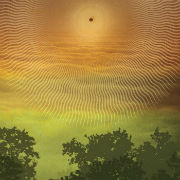
Home
|
STEVE
PALMER – USEFUL HISTORIES
(LP on Sunrise
Ocean Bender Records with Deep Water Acres)
Guitar
player Steve Palmer hails from Minneapolis and
‘Useful Histories’ is only his second full
length recording following his 2014 debut
‘Unblinking Sun’. It’s a record of band and solo
recordings that touches on many moods and styles
through its tracks.
‘Statesboro
Day’ opens the record on a real high. It starts
as a full fat motorik boogie where the central
rhythmic and melodic theme is clothed in an
ambient Kosmische overcoat that provides order
and layers of textural melody and colour but
then it unexpectedly breaks out into a freeform
cacophony of electronic noise and guitar
improvisation for the last few minutes of its
thrilling eleven minutes length. It’s as though
Michael Rother and Neu! really decided to let
their hair down and push their experimental
boundaries and it is wonderful. The next track,
‘Squalor’ takes a central repeating guitar
melody and slowly embellishes it with new
overlaid and overlapping layers of textural
colour and melody to create a dense, complex and
often quite claustrophobic but fascinating
shifting soundscape. ‘Thirty’ is a more
reflective and relatively speaking short solo
guitar piece that is spacious, melodic,
emotional and with a hint of desert blues
flavour and lonesome sepia toned American
Primitive elegance. ‘I am John Titor’ is another
long track of more than eleven minutes and is a
shimmering Kosmische informed soundscape where
the drone slowly shifts and pulses to create
beautiful, hypnotic and tranquil textures. After
a while occasional choppy guitar strokes and
other subtle fretboard interruptions begin to
appear as an undertone creating a slightly
edgier sound but it is restrained and really
never intrudes or dominates to take the music in
another direction. The title track ends the
record and is underpinned by a jaunty almost
funky shuffle over which another gorgeous, multi
layered and complex guitar soundscape is
constructed. It’s a well balanced arrangement
which keeps a central melody but at the same
time takes the tune in many directions, some of
which are melodic and some more abstract. It’s
clever and quite addictive.
Steve
Palmer has managed to make an album which could
have been too diverse and eclectic hold together
very well indeed. Impressive arrangement and
intelligent layering of sound are strong
characteristics of this record which also shows
off a fine guitar player doing things a little
differently. It can be challenging and is often
very beautiful and I for one will keep an eye
and ear out for Steve’s future projects which
hopefully won’t take another 6 years to
materialise.
(Francis Comyn)
|
|
|
|
|
Home |
THE
ISOLATED
PSYCHEDELICISTS – SOUNDS FROM
THE ISOLATION ZONE VOL.1
(Self
Released DL
on via sendelica.bandcamp.com)
Isolation
in the
wilds of West Wales isn’t the most difficult
thing to achieve in normal times
but in the midst of the current Coronavirus
pandemic this isn’t a situation of
personal choice but rather grim reality. In
keeping with the resourceful
cottage industry ethos that has produced many a
fine record at often
impressively and sometimes dizzyingly frequent
intervals over the years from
Sendelica World Headquarters, Pete Bingham and
collaborator Colin Consterdine
have embarked on a series of isolation
soundtracks. This is partly because it’s
a good thing to keep in touch in such times with
your musical colleagues and
friends and now more than ever food for the
imagination, and candy for the ears
is an essential basket item that your local
supermarket won’t be able to
provide.
As
you might
expect, The Isolated Psychedelicists display
shades of Sendelica and related
projects such as The Fellowship of Hallucinatory
Voyagers but there’s a sense
of trying out some new ideas and letting the
imagination roam a little which
introduces some different and pleasing elements
to the sonic palette. Titles
are not a fixed term on this outing and are
described as questions to make the
listener think and create their own personal
listening headspace or experience.
There is certainly a rich array of mood and
atmosphere to dive into and go your
own way with.
The
opening track
is the near thirteen minutes ‘All We Have To Do
Is Think’, a slow burning, deep
and cavernous sound that has a glacial elegance
where the harsh and lonesome
tundra evoked by the sparse atmospheric solo
guitar and accompanying swirling
electronic chill is stark but strangely
beautiful and indeed attractive. ‘The
Plague Doctor Will See You Know’ introduces an
electronic beat with a throbbing
Kosmische informed and industrial tinged
electronica that has shades of ambient
techno in its soul along with Steve Hillage’s
soaring guitar sound. It’s got
momentum and turns a few interesting corners on
its course showing the
improvisation and real time ideas at work in
this duo very effectively. ‘Is
Anything Ever Really Invisible’ is much shorter
in length but not short on
ideas where a mellow guitar melody is enveloped
in forest or jungle like sounds
that are both mysterious and slightly
claustrophobic, but relieved by the
gorgeous and spacious guitar solo cutting
through. The lengthy ‘When Do Birds
Ong’ takes the repetition of minimalist
composition and the electronic sounds
of 1970’s Germany to create a shimmering and
simmering cosmic soup. Bubbling
but never quite erupting with shades of Ash Ra
Tempel or solo Manuel Gottsching
and indeed more recent melodic electronic
explorers such as Steve Hauschildt in
its economical and subtle guitar melody wrapped
in intricate and delicate
electronic colours and textures. This is premium
music for driving at dawn or
sunset or along a deserted coastal highway if
indeed we could swing that as an
essential journey right now. ‘Shared Isolation’
has an aching and almost
stately filmic beauty and classical wistfulness.
There’s a touch of Sigur Ros
in the slowly repeating and spacious melody and
the simple yet elegant
atmosphere created. The final piece ‘Can We Ever
Really Predict The Past’ has an
atmospheric Gilmour-esque high flying guitar
sound where notes are few but
always matter underpinned by gentle techno
influenced electronics with
occasional radiophonic bursts and brings the
album to a gentle conclusion.
This
is a lovely
release which highlights free flowing ideas and
brings them to life wonderfully
well. Only available as a download at this time
which is a shame as it cries
out for a physical release but who knows? I
think there may already be a second
volume available and as we go forward into
uncertain times there may well be
further volumes for your lockdown pleasure. I
urge you to spend some time with
this album and check out future volumes which
will greatly enrich your time at
home, in your garden or indeed in any socially
distanced queue you may find
yourself and your headphones in.
(Francis
Comyn)
|
|
|
|
|
|
|
|
|
 |
|

